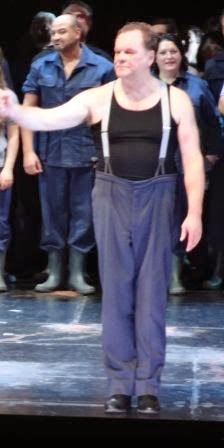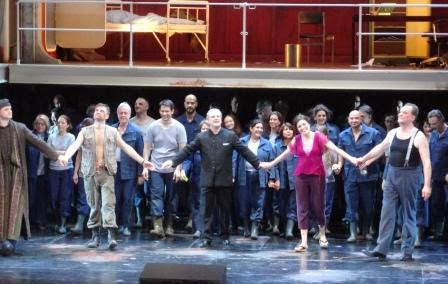(review in english
below)
Les Pêcheurs de
Perles é uma ópera de Georges Bizet
com libretto de Eugène Cormon e Michael
Carré. A acção passa-se no Ceilão.
Os pescadores de pérolas elegem Zurga como seu chefe. Nadir,
um antigo amigo de Zurga surge e os dois recordam que ambos se apaixonaram por
uma mulher mas, renunciaram amá-la e juraram amizade eterna. Surge uma
sacerdotisa virgem coberta com um véu que vem proteger os pescadores. Nourabad,
sumo sacerdote, recebe-a e diz-lhe que nunca pode tirar o véu. Nadir reconhece
nela a sua amada Leila, com quem traiu Zurga no passado. Amam-se novamente e
são encontrados por Nourabad. Os pescadores querem matar Nadir e Leila mas
Zurga recorda que é ele quem decide e resolve condená-los à morte. Leila pede-lhe
para poupar Nadir dado que ele a encontrou por acaso. Zurga diz que a traição
de Nadir não permite poupar-lhe a vida mas é atormentado pelo amor que também
sente por Leila. Quando Nadir e Leila estão perto da execução, surge Zurga que
mostra uma luz no céu que é um sinal divino. Os pescadores fogem e Zurga
confessa que foi ele que acendeu o fogo para poupar a vida dos amantes e
ajudá-los a fugir, cumprindo o seu dever.
O baixo norte americano Scott
Conner foi um Nourabad de voz segura e bem audível, a não destoar dor
restantes solistas.
Uma excelente récita em Zurique.
*****
LES
PÊCHEURS DE PERLES (The Pearl Fishers), Opernhaus Zürich , February 2014
Les Pêcheurs of Perles is an opera by Georges Bizet with libretto by Eugène Cormon and Michael Carré . The action takes place inCeylon
Les Pêcheurs of Perles is an opera by Georges Bizet with libretto by Eugène Cormon and Michael Carré . The action takes place in
The pearl
fishers elect Zurga as their leader. Nadir, a former friend of Zurga arises and
the two recall that both fell in love with a woman but renounced love to her
and swore eternal friendship. A virgin priestess covered with a veil arises,
coming to protect the fishermen.
Nourabad, high priest, tells her she can never take the veil. Nadir recognizes
her beloved Leila with whom he betrayed Zurga in the past. They make love each
other again and are seen by Nourabad. The fishermen want to kill Nadir and
Leila. Zurga says that it is he who decides, and condemns them to death. Leila
asks him to spare Nadir as he found her by chance. Zurga says the betrayal of
Nadir lets not chance to spare his life, but he is tormented by the love he
also feels for Leila. When Nadir and Leila are about to be murdered, Zurga appears
showing that a light in the sky is a divine sign. The fishermen flee and Zurga
confesses that it was he who lit the fire to save the lives of the two lovers
and help them escape, accomplishing his duty
The staging by Jens-Daniel Herzog is very interesting. The action takes place on a ship and is brought to the present days. The stage has three levels. On the bottom are the fishermen and workers extracting the pearls from the oysters, in an oppressive atmosphere, guarded by armed guards, the middle level is Zurga’s cabin with a bed and an office, where he keeps the pearls that are brought to him, and on the upper level, where it is written Arbeit macht frei, excuse-me, Le bonheur du travail, the altar to Leila is mounted. She appears hanging from the top of the stage, completely covered by colored veils. The main characters circulate through the three levels, the stage lowers sometimes hiding the lower level. The lights have very beautiful effects, all resulting in a simple but eye catching and effective staging.
The staging by Jens-Daniel Herzog is very interesting. The action takes place on a ship and is brought to the present days. The stage has three levels. On the bottom are the fishermen and workers extracting the pearls from the oysters, in an oppressive atmosphere, guarded by armed guards, the middle level is Zurga’s cabin with a bed and an office, where he keeps the pearls that are brought to him, and on the upper level, where it is written Arbeit macht frei, excuse-me, Le bonheur du travail, the altar to Leila is mounted. She appears hanging from the top of the stage, completely covered by colored veils. The main characters circulate through the three levels, the stage lowers sometimes hiding the lower level. The lights have very beautiful effects, all resulting in a simple but eye catching and effective staging.
Musical
direction was by Swiss maestro Patrick
Fournillier. The Orchestra and Chorus of the Zurich Opera offered us a good
interpretation of the score which is of great melodic beauty. But the
soloists were the best of the performance.
German baritone Michael Volle was a fabulous Zurga. I think it will be hard to find a better.one In addition to the irreproachable artistic performance, vocally he was smashing. The voice is very expressive and with a beautiful timbre, he has an overwhelming power that completely filled the theater and the soul of all who heard him. He was always great, but in duets with Nadir "Au fond du temple saint" and with Leila "Je fremis, je chancelle" he was unsurpassed .Fantastic!
German baritone Michael Volle was a fabulous Zurga. I think it will be hard to find a better.one In addition to the irreproachable artistic performance, vocally he was smashing. The voice is very expressive and with a beautiful timbre, he has an overwhelming power that completely filled the theater and the soul of all who heard him. He was always great, but in duets with Nadir "Au fond du temple saint" and with Leila "Je fremis, je chancelle" he was unsurpassed .Fantastic!
Pavel Breslik, slovak tenor, was acceptable in the demanding
role of Nadir. He has a beautiful, though not very powerful, but very pleasant
voice. He seems to struggle considerably in the high register, but he can sing
all notes in tune, but losing a bit of volume and harmony. In the most famous
aria " Je crois entender encore " he did well but, when I listen to
this aria, I can not help remembering anthologic interpretations of other
singers, from whom he is still distant.
Also amazing was Lelia by Latvian soprano Marina Rebek . The voice is beautiful, always in tune, powerful and very expressive. She only becomes slightly harsh on high notes that are sung in more effort, but she was an extraordinary performer. And the audience acknowledge it.
North American bass Scott Conner was a strong and well audible Nourabad, in line with the other soloists.
An excellent performance inZurich
*****
Also amazing was Lelia by Latvian soprano Marina Rebek . The voice is beautiful, always in tune, powerful and very expressive. She only becomes slightly harsh on high notes that are sung in more effort, but she was an extraordinary performer. And the audience acknowledge it.
North American bass Scott Conner was a strong and well audible Nourabad, in line with the other soloists.
An excellent performance in
*****















Sem comentários:
Enviar um comentário